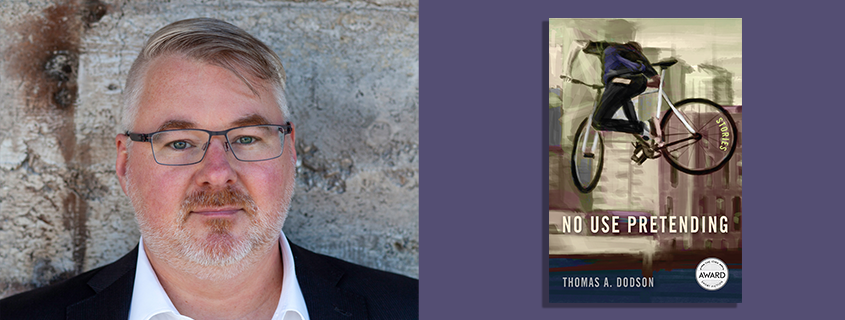We are thrilled to announce the upcoming release of No Use Pretending, a compelling collection of stories by the talented writer and librarian, Thomas Dodson. The book delves into the complex and often poignant aspects of human existence, exploring themes of suffering, addictive attachments, and the search for solace. The stories traverse various genres, shedding light on contemporary issues such as fracking and drone warfare.
Thomas Dodson has generously agreed to join us on November 9th at 5:30 PM in the Meese Room at Hannon Library for a reading and an enlightening Q&A session. In case you can’t join us in person, worry not! We’ve organized a live Zoom session, so you can still be part of this enriching experience. Just follow this link to connect with us virtually.
To give you a taste of what to expect and to pique your interest further, we have prepared an interview with Thomas Dodson, diving into the heart of No Use Pretending.
Interview with Thomas Dodson
1. Can you tell us a bit about the inspiration behind your book, No Use Pretending?
I wrote, revised, and published these stories over ten years, so there they draw from many different sources. Sometimes it’s something in the news—bee hive heists in California, anthropogenic earthquakes in Oklahoma, the opioid epidemic—and other times it can be something more personal.
I have a great love for and fascination with the city of New Orleans, for example. I lived there for a couple of years before Katrina, and one of the stories is about the grief I felt about all that was lost after the storm. I didn’t want to write a “Katrina story,” though, and also didn’t want to present myself as either a native or a cultural insider. So, in my NOLA story, the main character is someone who has never been there before, encountering this strange and wonderful place for the first time, but seeing it through the lens of personal grief—he’s just lost his son in a bicycle accident and has come to New Orleans to claim the body.
2. The stories in No Use Pretending span diverse genres and touch on pressing issues like fracking and drone warfare. How did you choose the range of genres and topics for this collection, and what impact do you hope these stories will have on readers?
In terms of genres and formal elements and so on, I was really just trying things out. It’s different now, but not that long ago, a lot of fiction writers consciously began with the short story form—honing their craft writing stories before taking on a novel. I like that approach and so sort of see the book as my journeyman work, a space to experiment and find out what I’m good at as a writer.
In terms of the issues raised in the stories, my hope would be that reading one of them has the potential to be eye-opening or unsettling—in the sense of “oh, this issue is more complicated than I thought it was; maybe what I thought was my settled position on this isn’t nuanced enough.” That kind of invitation for the reader to think about, or perhaps reconsider, an issue is what I’m going for—something very different, I believe, than trying to tell the reader how they “ought” to think and feel about something. I find that approach incredibly condescending and do all that I can to avoid it.
3. The characters in your stories are often holding on to a lot of emotional pain and seek relief through addictive behaviors. Could you share how you developed these characters and their stories, and what message you intend to convey through their experiences?
Just about everyone I know, myself included, has had an unhealthy relationship with alcohol or something like that at some time in their life. I think a lot of the time substance abuse is a way for people to try to deal with loneliness or feeling like an outsider, or like you’re consistently being judged and misunderstood, that you don’t have a community that accepts you.
That’s an intolerable feeling for most people, and if you feel powerless to change the situation, you go looking for relief wherever you can find it. A lot of people find temporary relief in addictive attachments. Unfortunately, over time, those attachments inevitably make things worse rather than better, leading to more isolation, now compounded by shame.
The Buddhist teacher Pema Chödrön talks about it like this: It’s like having scabies, a condition which causes terrible itching. Scratching provides temporary symptom relief, but over time it makes the condition worse. It can be very hard to choose to endure the itching, even knowing that this is what will lead to its eventual cessation. When the discomfort is so great, it’s hard to turn away from what has soothed the symptoms in the past. I guess in the stories that deal with addiction, I’d like the reader to develop a greater empathy for people in that dilemma (or perhaps for themselves, if they see their experience reflected in the characters), even if the things these characters do to deal with their pain can seem selfish or crazy or self-destructive.
4. The collection explores a wide array of themes and emotions. Are there specific messages or takeaways you hope readers will carry with them after reading No Use Pretending?
I think maybe just that being a human being and trying to do the right thing (especially the way modern society is organized) is very hard, that everyone is struggling in ways we can’t see, and that everyone is worthy of empathy.
Also, that having empathy for someone (or for a character) isn’t the same thing as approving of what they do or endorsing their ideas. I think sometimes people conflate understanding and empathy with complicity; I find that attitude very unfortunate and limiting. I like how Garth Greenwell puts it in a recent essay in The Yale Review: “Art can offer us this crucial moral training, placing us in the impossible position…of cherishing the existence of others we cannot bear.”
Stay tuned for the event on November 9th, where we will hear directly from Thomas Dodson and gain deeper insights into the captivating world of No Use Pretending.
Don’t miss this opportunity to engage with a talented author and explore the complexities of the human condition through the lens of his exceptional storytelling. Join us for an enriching literary experience on November 9th!
For those unable to attend in person, join our live Zoom session through this link here.

